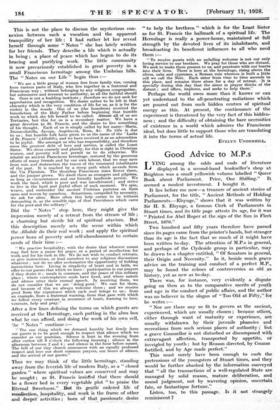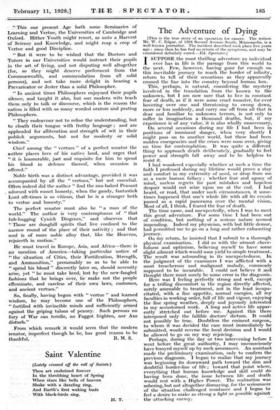Good Advice to M.P.s
.YING among the odds and ends of literature A displayed in a second-hand bookseller's shop at Brighton was a small yellowish volume labelled " Queer Book about Parliament. Price, One Shilling." It seemed a modest investment. I bought it, It lies before me now—a treasure of ancient stories' of Parliament, for the title, " Ancient Methods of Holding Parliaments.—Elsynge," shows that it was written by Sir H. S. Elsynge, a famous Clerk of Parliaments in Stuart times, and its title page attests its age, for it was " Printed for Abel Roper at the, sign of the Sun in Fleet Street, 1670."
Two hundred and fifty years therefore have passed since its pages came from the printer's hands, but stranger than its age is the fact that so much of it might have been written to-day. The attention of M.P.s in general, and perhaps of the Clydeside group in particular, may be drawn to a chapter entitled, " Of Senators in general, their Origin and Necessity.", In it, beside much graye advice on the training and conduct of a perfect M.P., may be found the echoes of controversies as old firs history, yet as new as to-day.
There was, for instance, very evidently a dispute going on then as to the comparative , merits of youth and age in the conduct of public affairs, and the author was no believer in the slogan of " Too Old at Fifty," for he writes :- " Nor are there any so fit to govern as the ancient, experienced, which are usually chosen ; bedause otherg, either through want of maturity or experience, are usually withdrawn by their juvenile phancies and recreations from such serious places of authority f but a grave Counsellor is not disturbed or discoMposed with- extravagant affection, transported by appetite, Cr inveigled by youth ; but by Reason directed, by Counse fortified, and by Age made perfect."
This must surely have been enough to curb the pretensions of the youngsters of Stuart times, and they would be further abashed by the information conveyed that " all the transactions of a well-regulated State are managed by solid reason, mature deliberation, and sound judgment, not by wavering opinion, uncertain fate, or fantastique fortune," .
Listen, too, to this passage. Is .-it not strangely reminiscent ? "This our present. Age hath some Seminaries of Learning and Vertue, the Universities of Cambridge and Oxford. Hither Youth might resort, as unto a Harvest of Science and. Knowledge, and might reap a crop of Vertue and good Discipline. .
" But it were to be wished that the Doctors and Tutors in our Universities would instruct their pupils in the art. of living, and not disputing well altogether (for, so they might deserve preferment from the Commonwealth, and commendation from all solid • persons), . and not take more delight in hearing a Prevaricator or Jester than a solid Philosopher. - " In ancient times Philosophers enjoyned their pupils silence, and _taught it ,also, but our modern wits. teach them ;only to talk or discourse, .which is the reason the nation is filled with so many worded orators and prating Philosophers. • " They endeavour not to refine the understanding; but • to cloath their tongue with frothy language ; and are applauded for alliteration and strength of: wit in their publick arguments, but not for modesty - or solid wisdom". . . . . • Chief among the " vertues " of a perfect senator the author places love of his native land, and urges that " it is honourable, just and requisite for him to spend his blood in defence thereof, when occasion is offered:" - • • Noble birth was a distinct advantage, provided it was accompanied by all the " vertues,"- but not essential. Often indeed did the author " find the sun-baked Peasant , adorned with russet honesty, when the gaudy, fantastick Lord oft-times is so vitious; that he is a stranger both to vertue and honesty." • The perfect senator must also be " a man of the World." The author is very contemptuous of " that tub-hugging- Cyniek Diogenes," and observes that " Those are dunghill spirits that live confined to the narrow round of the place of their nativity ; and that soul' is of- more noble alloy that, like the Heavens, rejoiceth in motion."
Ire must travel in Europe, Asia, and Africa—there is no mention of America—taking particular notice of " the situation of Cities, their Fortification, Strength, and Ammunition," presumably so as to be able to " Spend 'MS blond " discreetly later on, should necessity arise, Yet " he must take heed; lest by the new-fangled fashions that he brings over,' lie make not the people effeminate, and Careless of their own laws, customes, and ancient vertues."
So, finally, having begun with " vertue " and learned wisdom, he may become One of the Philosophers, " fortified with invincible minds and sufficiently armed against the griping talons of penury. Such persons no fury of War can terrifie, no Faggot frighten, nor Axe disturb."
From which remark it would seem that the MOdern Senator, imperfect though he be, has good reason to be







































 Previous page
Previous page